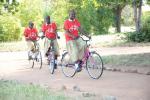The campaign mobilizes citizens to contribute bikes for girls in disadvantaged conditions in rural Tanzania, distance being a major determinant factor in selecting schools and girls who benefit from the campaign.
It looks like a simple idea, but one girl, one bike is an ambitious, action oriented effort to ensure that girls living in disadvantaged situations have access to education - one girl, one bike at a time.
Distance is a challenge to many of these girls in the villages dreaming of attending school, because the risks associated with the school trip. It puts girls in high risk of sexual harassment, teenage pregnancies which lead to dropping out and early marriages. Personal case studies show that most girls fall prey to bodaboda drivers (motorbike drivers) which is the common means of transport, when they are offered a free ride to school.
Also some of the girls simply loose hope and interest in school because the distance becomes too much of a challenge, while they are not afforded the same treatment as the boys. They still have to conduct house chores when they get home, this and other factors affect their performance, and therefore they decide to drop out.
Rebecca Gyumi, an SDGs Goal Keepers award winner and a UN Human Rights awardee in 2018 (I can also mention a personal friend of mine, and an inspiration to thousands of young people in Tanzania), is the Executive Director of Msichana Initiative, the organization behind the campaign, firmly believes that despite the fact that One Girl, One Bike is just a small scale campaign at the moment, it has the potential to be replicated and up scaled.

Since 2017 the campaign has been able to donate bicycles in two regions, a total of 60 bikes have been handed out to girls ever since. The attendance of the beneficiaries has improved by 70 percent, not only the direct beneficiaries, but most of the girls share the bikes with other girls, and it becomes One Bike, Two Girls.
It is clear that girls in rural areas, especially those mostly affected by child marriages and teenage pregnancies, face a lot of challenges in access to education, and it will take more than a bike to ensure that there is equality in accessing education for both girls and boys.
But this particular action, is what the Sustainable Development Goals (SDGs) are all about, they are not only about the big budgets and national actions, the theme of Leaving No One Behind embraces the fact that every little action matters. Everyone has a part to play in achieving the SDGs and in this particular case access to education and gender equality, goals 4 and 5.
It is stories like this that inspire positive action at the grassroots level. Inspiring communities to play a part in changing lives and bringing positive impact. Achieving the SDGs requires a collective of actions from the grassroots, amplified throughout the country, contributing to a common goal.
Reynald Maeda is the Secretary General of the United Nations Association of Tanzania and Co-Convener of the Tanzania Sustainable Development Platform
The Good News Blog collects comments from people around the world that work with Sustainable Development on what they see as recent positive developments in the field. The views expressed in the blog are the writers own, and do not necessarily represent the official standpoint of UNA Finland.
#parhaatuutiset #worldsbestnews

Lue muita hyviä uutisia täällä. Seuraile tunnistetta #parhaatuutiset ja some-kanaviamme (Facebook, Twitter ja Instagram), niin pysyt kärryillä hyvistä uutisista. Kannattaa myös tilata uutiskirjeemme. Lue lisää: www.maailmanparhaatuutiset.fi
Hanke saa Euroopan unioninin Frame, Voice, Report -rahoitusta. Sisällöstä vastaa tuensaaja, eikä sen voida missään olosuhteissa katsoa heijastavan Euroopan unionin kantaa.

